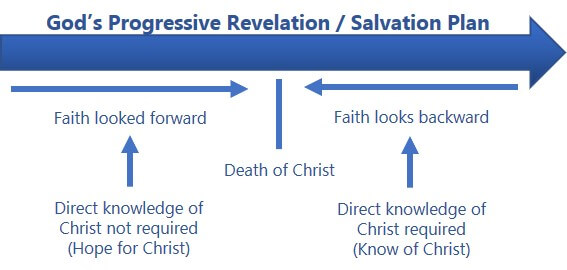The question should not be whether those OT saints were eternally saved or not, the question is, who’s righteousness did they have and how?
It is true that it was by the power of their own effort to keep the Old Testament laws, for they could not have the Spirit as in the New Testament, which John the Baptist was the first to have the Spirit which was from the womb, and give him power to live right, and prepare the way for Christ.
But the Spirit did not save John from the womb, but only gave him power to prepare the way for Jesus, and John did not receive the Spirit to save him while on earth, for Jesus was not glorified yet, and that is why Jesus said born of women there has not been a greater than John the Baptist, but a person that is least in the kingdom of God is greater than him.
1Sa 15:22 And Samuel said, Hath the LORD as great delight in burnt offerings and sacrifices, as in obeying the voice of the LORD? Behold, to obey is better than sacrifice, and to hearken than the fat of rams.
1Sa 15:23 For rebellion is as the sin of witchcraft, and stubbornness is as iniquity and idolatry. Because thou hast rejected the word of the LORD, he hath also rejected thee from being king.
Heb 5:8 Though he were a Son, yet learned he obedience by the things which he suffered;
Heb 5:9 And being made perfect, he became the author of eternal salvation unto all them that obey him.
Rom 11:20 Well; because of unbelief they were broken off, and thou standest by faith. Be not highminded, but fear:
Rom 11:21 For if God spared not the natural branches, take heed lest he also spare not thee.
Rom 11:22 Behold therefore the goodness and severity of God: on them which fell, severity; but toward thee, goodness, if thou continue in his goodness: otherwise thou also shalt be cut off.
Heb 10:26 For if we sin wilfully after that we have received the knowledge of the truth, there remaineth no more sacrifice for sins,
Heb 10:27 But a certain fearful looking for of judgment and fiery indignation, which shall devour the adversaries.
There is no difference between Old and New Testament as far as us obeying, and if we do not obey the truth of what God lays down as the law then we will be cut off like the Jews that did not obey.
Which Paul says we do not void out the law through faith, but we establish the law, and the law is spiritual, and holy, just, and good.
If a person hates sin, and does not want sin, by the Spirit they can abstain from sin, for a Spirit led life will not fulfill the lusts of the flesh, for they have crucified the flesh with the lusts and affections, and show the ways of the Spirit, and God will not allow them to be tempted above what they can handle, and will give them an escape from the temptation so they can bear it.
If they had such a demand on them in the Old Testament to obey without the Spirit, how much more of a demand in the New Testament with the Spirit.
But some have a form of godliness, but deny the power thereof, from such turn away.
A Spirit led life is not under the law, for their sins are forgiven, and they are abstaining from sins, so the law cannot touch them for prosecution.
If a person sins they are led of the flesh, and not the Spirit, and under the law, and if they repent, and mean it, and do not want it again, then they are forgiven, but if they hold unto sin there is no more sacrifice for that sin, for the blood of Christ will not wash it away.

